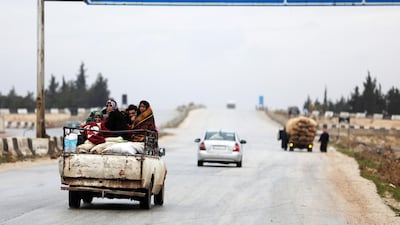Amid faltering negotiations to end Syria's civil war, a ground assault on Idlib by Bashar Al Assad's forces takes the fight to the rebels in the one area they felt most secure against such an attack.
A coalition of Islamist rebel groups including, the Al Qaeda affiliate Jabhat Al Nusra and the powerful Ahrar Al Sham militia, swept through the north-western province bordering Turkey in the spring of 2015. It has remained in rebel hands despite subsequent factional fighting and relentless government bombardment, including chlorine and sarin gas attacks.
As rebels lost battles elsewhere in the country, government-imposed ceasefire agreements would send those fighters as well as civilians from those areas to Idlib, swelling the population of the fledgling statelet to about two million.
As rebel infighting escalated, Jabhat Al Nusra, which had by then severed ties with Al Qaeda and rebranded itself Jabhat Fatah Al Sham, swallowed lesser militias and emerged as the dominant force in a new coalition, Hayat Tahrir Al Sham. It quickly established its military supremacy, driving out Ahrar Al Sham, its main Islamist rival, and recently set up a formal "government of national salvation" to serve as its political face.
The incursion by Syrian troops and allied forces into southern Idlib in late December is not only a challenge to rebel control of the province but also but a major setback to the opposition as a whole as it seeks to negotiate a transition of power from the Assad regime. Activists say the rebels in Idlib have retreated and done little to repel the government's advance, which is supported by heavy bombardment by Syrian and Russian jets.
The advance into Idlib appears to involve a thrust towards Abu Al Dhuhour airbase, a military complex that the government might use to cut off rebels in neighbouring Aleppo province from their counterparts in Idlib, and which is situated close to a highway leading to other western provinces.
It is not yet clear if the government is planning a broader campaign to reclaim the entire region, an undertaking that would face stiff resistance from entrenched rebels as well as cause a humanitarian catastrophe with another refugee surge into Turkey and untold civilian casualties.
The fighting has already forced thousands of residents to flee towards Turkey.
"There are people carrying all their belongings on cars everywhere, headed to the border," said one activist from Idlib who fled his home on Saturday for the Atmeh refugee camp near the Turkish border. "Entire villages have been displaced and abandoned."
_______________
Read more:
Forces loyal to Assad have stepped up offensive in Idlib province
Syria rebel enclave is Assad regime's weak spot
Syrian army prepares assault to end rebel siege of base east of Damascus
_______________
Many had come from Aleppo when that city fell a little more than a year ago, others from Homs, the countryside near Damascus, and many other areas where the opposition surrendered to the regime's superior firepower in exchange for safe passage.
“Displacement creates social, economic and humanitarian problems that can fell strong states, let alone impoverished areas exhausted by war that have no central services or authority,” said an Ahrar Al Sham official in Syria. “The criminal regime and its allies are using the pain of people in displacement because they believe they will agree to any compromises in order to return home.”
The Syrian advance will also alarm Ankara because, as part of a “de-escalation” agreement reached with Assad allies Russia and Iran, Turkey has deployed peacekeeping troops in Idlib. Their presence appears to have done little to limit the bombardment.
The renewed fighting in Idlib has also refocused attention on Hayat Tahrir Al Sham, which has used its military and political dominance in the province to impose hardline Islamist restrictions on residents, such as banning women from living alone without a male relative. This week, the group sought to close down college lectures involving students that had opposed its national salvation government.
Sam Heller, a Beirut-based fellow with The Century Foundation think tank, said the regime's corralling of opposition refugees and fighters into Idlib was primarily a strategy to demonstrate that the alternative to it was hardline jihadist rule.
“I think the idea was not only to deposit residents of these 'reconciled' areas in an opposition-held dumping ground, but to do it in the least hospitable one possible — one run by predatory jihadist factions, and that would be culturally alien to people from, for example, the Damascus countryside,” he said. “The regime also counted on the jammed-in residents of the rebel north-west, including its armed factions, to basically consume each other.
“And this strategy has also given the regime a useful bogeyman, allowing it to point to this low-functioning jihadist thing in Idlib as the real alternative to its own rule.”
The Ahrar Al Sham official said that Hayat Tahrir Al Sham's control over Idlib, and its destruction of rebel factions that it deemed rivals, had damaged the opposition's cause and provoked anger from residents through its policies.
“In short, the presence of HTS weakened the revolution militarily and politically,” he said.


